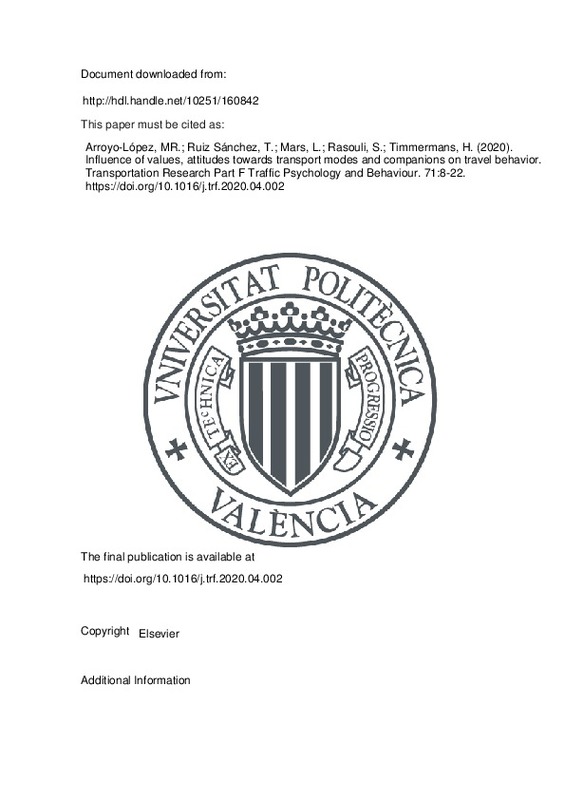Alemi, F., Circella, C., Handy, S. (2017). Measuring Environmental and Transportation-Related Attitudes in the California Millennials’ Study. In Presented at 11th International Conferences on Transport Survey Methods, Estérel, Montreal, Canada, 24-29 September, 2017.
Axhausen, K. W. (2006). Social factors in future travel: an assessment. IEE Proceedings - Intelligent Transport Systems, 153(2), 156. doi:10.1049/ip-its:20060008
Browne, M.; Cudeck, R. (1992). Alternative ways of assessing model fit. In Testing Structural Equation Models.
[+]
Alemi, F., Circella, C., Handy, S. (2017). Measuring Environmental and Transportation-Related Attitudes in the California Millennials’ Study. In Presented at 11th International Conferences on Transport Survey Methods, Estérel, Montreal, Canada, 24-29 September, 2017.
Axhausen, K. W. (2006). Social factors in future travel: an assessment. IEE Proceedings - Intelligent Transport Systems, 153(2), 156. doi:10.1049/ip-its:20060008
Browne, M.; Cudeck, R. (1992). Alternative ways of assessing model fit. In Testing Structural Equation Models.
Carrasco, J. A., Miller, E. J., & Wellman, B. (2008). How Far and with Whom Do People Socialize? Transportation Research Record: Journal of the Transportation Research Board, 2076(1), 114-122. doi:10.3141/2076-13
A definition of «social environment». (2001). American Journal of Public Health, 91(3), 465a-465. doi:10.2105/ajph.91.3.465a
De Groot, J. I. M., & Steg, L. (2007). Value Orientations to Explain Beliefs Related to Environmental Significant Behavior. Environment and Behavior, 40(3), 330-354. doi:10.1177/0013916506297831
De Groot, J., & Steg, L. (2007). General Beliefs and the Theory of Planned Behavior: The Role of Environmental Concerns in the TPB. Journal of Applied Social Psychology, 37(8), 1817-1836. doi:10.1111/j.1559-1816.2007.00239.x
Dijst, M., Farag, S., & Schwanen, T. (2008). A Comparative Study of Attitude Theory and other Theoretical Models for Understanding Travel Behaviour. Environment and Planning A: Economy and Space, 40(4), 831-847. doi:10.1068/a39151
García J., Mars, L., Arroyo, R., Casquero, D., Di Ciommo, F. and Ruiz, T. (2019). Personal values, attitudes and travel intentions towards cycling and walking, and actual behavior. Sustainability 2019, 11(13), 3574.
Gardner, B., & Abraham, C. (2010). Going Green? Modeling the Impact of Environmental Concerns and Perceptions of Transportation Alternatives on Decisions to Drive. Journal of Applied Social Psychology, 40(4), 831-849. doi:10.1111/j.1559-1816.2010.00600.x
Gärling, T., & Fujii, S. (2009). Travel behavior modification: Theories, methods, and programs. In The expanding sphere of travel behaviour research: selected papers from the 11th international conference on travel behaviour research. Bingley, UK: Emerald Group Publishing Limited, 97–128.
Ho, C., & Mulley, C. (2013). Tour-based mode choice of joint household travel patterns on weekend and weekday. Transportation, 40(4), 789-811. doi:10.1007/s11116-013-9479-0
Homer, P. M., & Kahle, L. R. (1988). A structural equation test of the value-attitude-behavior hierarchy. Journal of Personality and Social Psychology, 54(4), 638-646. doi:10.1037/0022-3514.54.4.638
Hu, L., & Bentler, P. M. (1999). Cutoff criteria for fit indexes in covariance structure analysis: Conventional criteria versus new alternatives. Structural Equation Modeling: A Multidisciplinary Journal, 6(1), 1-55. doi:10.1080/10705519909540118
Hunecke, M., Haustein, S., Böhler, S., & Grischkat, S. (2008). Attitude-Based Target Groups to Reduce the Ecological Impact of Daily Mobility Behavior. Environment and Behavior, 42(1), 3-43. doi:10.1177/0013916508319587
Kim, J., Choi, K., Kim, S., & Fujii, S. (2016). How to promote sustainable public bike system from a psychological perspective? International Journal of Sustainable Transportation, 11(4), 272-281. doi:10.1080/15568318.2016.1252450
Klöckner, C. A., & Matthies, E. (2009). Structural Modeling of Car Use on the Way to the University in Different Settings: Interplay of Norms, Habits, Situational Restraints, and Perceived Behavioral Control. Journal of Applied Social Psychology, 39(8), 1807-1834. doi:10.1111/j.1559-1816.2009.00505.x
Lind, H. B., Nordfjærn, T., Jørgensen, S. H., & Rundmo, T. (2015). The value-belief-norm theory, personal norms and sustainable travel mode choice in urban areas. Journal of Environmental Psychology, 44, 119-125. doi:10.1016/j.jenvp.2015.06.001
Muñoz, B., Monzon, A., & Lois, D. (2013). Cycling Habits and Other Psychological Variables Affecting Commuting by Bicycle in Madrid, Spain. Transportation Research Record: Journal of the Transportation Research Board, 2382(1), 1-9. doi:10.3141/2382-01
Nordlund, A. M., & Garvill, J. (2003). Effects of values, problem awareness, and personal norm on willingness to reduce personal car use. Journal of Environmental Psychology, 23(4), 339-347. doi:10.1016/s0272-4944(03)00037-9
Pojani, E., Van Acker, V., & Pojani, D. (2018). Cars as a status symbol: Youth attitudes toward sustainable transport in a post-socialist city. Transportation Research Part F: Traffic Psychology and Behaviour, 58, 210-227. doi:10.1016/j.trf.2018.06.003
Paulssen, M., Temme, D., Vij, A., & Walker, J. L. (2013). Values, attitudes and travel behavior: a hierarchical latent variable mixed logit model of travel mode choice. Transportation, 41(4), 873-888. doi:10.1007/s11116-013-9504-3
Schwartz, S. H. (1992). Universals in the content and structure of values: Theory and empirical tests in 20 countries. In Advances in Experimental Social Psychology, vol. 25 (pp. 1–65). New York, NY, USA: Academic Press.
Srinivasan, S., & Bhat, C. R. (2008). An exploratory analysis of joint-activity participation characteristics using the American time use survey. Transportation, 35(3), 301-327. doi:10.1007/s11116-007-9155-3
Thomas, G. O., Walker, I., & Musselwhite, C. (2014). Grounded Theory analysis of commuters discussing a workplace carbon-reduction target: Autonomy, satisfaction, and willingness to change behaviour in drivers, pedestrians, bicyclists, motorcyclists, and bus users. Transportation Research Part F: Traffic Psychology and Behaviour, 26, 72-81. doi:10.1016/j.trf.2014.06.009
Vandenberg, R. J., & Lance, C. E. (2000). A Review and Synthesis of the Measurement Invariance Literature: Suggestions, Practices, and Recommendations for Organizational Research. Organizational Research Methods, 3(1), 4-70. doi:10.1177/109442810031002
Vovsha, P., Petersen, E., & Donnelly, R. (2003). Explicit Modeling of Joint Travel by Household Members: Statistical Evidence and Applied Approach. Transportation Research Record: Journal of the Transportation Research Board, 1831(1), 1-10. doi:10.3141/1831-01
Ye, R., & Titheridge, H. (2017). Satisfaction with the commute: The role of travel mode choice, built environment and attitudes. Transportation Research Part D: Transport and Environment, 52, 535-547. doi:10.1016/j.trd.2016.06.011
[-]







![[Cerrado]](/themes/UPV/images/candado.png)


